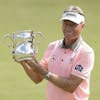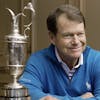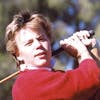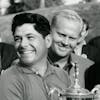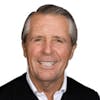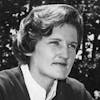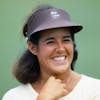Jack Nicklaus - Part 1 (The Early Years and the Evolution of Technology)
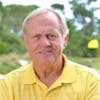
Arguably, the greatest professional golfer of all time, Jack Nicklaus, joins us to reminisce about his 60+ year friendship with Bruce Devlin and the early days traveling the globe together, promoting the game. Winner of 18 major championships (and 19 runner-up finishes), Jack is a World Golf Hall of Fame member with countless other honors and awards befitting a man of his unprecedented accomplishments. Listen in as we talk about his approach to the game, how he learned to properly prepare for the majors and, how he feels about the evolution of technology in the game. Jack Nicklaus, in Part 1 of our visit, shares his early story, "FORE the Good of the Game."
Support the showFollow our show and/or leave a review/rating on:
Our Website https://www.forethegoodofthegame.com/reviews/new/
Apple Podcasts https://podcasts.apple.com/us/podcast/fore-the-good-of-the-game/id1562581853
Spotify Podcasts https://open.spotify.com/show/0XSuVGjwQg6bm78COkIhZO?si=b4c9d47ea8b24b2d
Google Podcasts https://podcasts.google.com/feed/aHR0cHM6Ly9mZWVkcy5idXp6c3Byb3V0LmNvbS8xNzM3Mjc1LnJzcw
About
"FORE the Good of the Game” is a golf podcast featuring interviews with World Golf Hall of Fame members, winners of major championships and other people of influence in and around the game of golf. Highlighting the positive aspects of the game, we aim to create and provide an engaging and timeless repository of content that listeners can enjoy now and forever. Co-hosted by PGA Tour star Bruce Devlin, our podcast focuses on telling their life stories, in their voices. Join Bruce and Mike Gonzalez “FORE the Good of the Game.”
Thanks so much for listening!
Music playing 00:10
Intro music
Mike Gonzalez 00:15
Welcome to another edition of "FORE the Good of the Game" and Bruce Devlin, I've got to tell you, I'm so excited about our guest this morning. I'm certainly not worthy to introduce this man. And I do notice that you must not have gotten the memo regarding proper attire for this morning's interview.
Bruce Devlin 00:33
Well, thanks a lot for leaving me out, you two guys in your yellow shirts. Man, what a great guest we have today. I think people could arguably say the finest player that ever set foot on a golf course. 18-time major champion, Jack Nicklaus. We're so proud to have you with us Jack. Thanks a lot.
Jack Nicklaus 00:56
Thanks, Bruce and Mike.
Mike Gonzalez 00:58
Great to have you and Jack, before we get started with a look-back, we're gonna want to go back 60, 65 years when you guys first encountered each other, but I'd be remiss if I didn't mention this, which I think will be historic. And that's talking about this young man, Jon Rahm, I don't know how you could be any prouder of the way this young man has comported himself the last few weeks.
Jack Nicklaus 01:23
I think he's done very well I mean he was playing fantastic at the Memorial tournament. And he shot a 64 the third round, which the conditions were not easy. And I don't know what he was maybe low by three shots or something like that. Moved out to a six-shot lead in the tournament. And all of a sudden is told that he tests positive for COVID-19. And boom, his tournament's over. We felt bad at the Memorial tournament obviously and you know, Jon, was a, you know, he was our defending champion to start with. And he ended up having to head home and then you know, I dropped him a note right after it and said, I don't know whether you know, you'll get this before you play in the U.S. Open or not. But you know, keep up your good play. We all felt bad what happened in the Memorial tournament, and we think that you've got yourself on a run and keep it going and we'll be rooting for you. So, Jon goes out and plays he played a beautiful tournament and the two putts he holes on the last two holes. Wow, were they something else? I mean, two rainbows and left to right rainbows which are harder for a right-handed player to start with. And, you know, it's I thought it was very impressive I was very happy for him. And he’s gonna win a lot more.
Bruce Devlin 02:52
He showed himself what a class act he is, Jack, when you think about it, you know. First of all, you can think about the money, that's one thing, but all of the points for the FedEx cup, you know, he lost all of that. Yet he handled it just like a true champion that he is, and I know you're proud of him.
Jack Nicklaus 03:12
Yeah, he handled it very well.
Mike Gonzalez 03:16
So, Jack, let's go back to your earliest recollections of the young fella here, Bruce Devlin, What's your first memories of encountering Bruce?
Jack Nicklaus 03:26
Bruce and I met 1960 at Merion at the World Cup. And I don't remember whether we played together or not in that tournament, but we met and when the tournament was over, Bruce came to Columbus along with Murray Grindrod from South Africa. And the three of us went to Columbus and played a couple of days. Then we went on to St. Louis and played in the U.S. Amateur. And you know, that was started a friendship that's lasted for good gracious, what is now?
Bruce Devlin 04:02
61 years.
Jack Nicklaus 04:03
61 years. That's, pretty good. And we've had a lot of good times, we played a reasonable amount of golf together and socialized. You know, I remember once when we threw a couple of steaks out the window in Sydney. We'll get to that story later. But I'm sure we'll get to that. But anyway, we've had a lot of fun together through the years. We've been we've been good buddies for a long time.
Mike Gonzalez 04:36
And Bruce, that that trip to Merion and then to Columbus and then on to Bellerive for that 1960 U.S. Amateur
Jack Nicklaus 04:43
St. Louis Country Club
Mike Gonzalez 04:44
Oh, was it the St. Louis Country Club? Okay. All right. I stand corrected. That was, wasn't it your first trip to America?
Bruce Devlin 04:51
Ah, that was my first trip. I actually went through America in 1958 going to the inaugural Eisenhower Cup matches at St. Andrews. And then, of course, the second one, like Jack mentioned was, was at Merion in 1960. And that was where our friendship started. And you know, we've had Jack out to Australia a few times and people love him out there. He's, he's always been a treasure to be around.
Mike Gonzalez 05:23
You both had an opportunity, I suppose, as you were represented by Mark McCormack and IMG to play in several exhibitions as you guys were showcased around the world. You and Arnold Palmer and Jack and Gary Player, I suppose.
Bruce Devlin 05:38
Yeah, that brings in the little story that Jack started on a minute ago about throwing steaks out of the window of the hotel. But we've been, I think I'm correct by saying this, I think we played an exhibition in Adelaide together that day. And then we came back East, and we checked into a hotel, and we sort of got in there late. And we decided, you know, can we call room service, and they were nice enough to say, you know, we're actually close. But if you guys want some food, you know, we'll send it up to you. So, we ordered steaks and they come up. They were like shoe leather weren't they Jack?
Jack Nicklaus 06:18
Like little frisbees. I don't want to give Chevron a bad name, but that's where it was. But anyway, we, I guess, I don't know, Bruce opened the window, and he says here, let's have a couple of frisbees and throw them out the window. So, I suppose a couple of dogs down below had a pretty good meal that night. I suppose a lot of people would have liked that. It was not probably the best thing we could have done. But if you'd have seen 'em I don't think you could have I don't think the bottom of your shoes would have been any better off if you put them on.
Mike Gonzalez 06:54
When did you first venture over to Australia Jack? Was that for an Australian Open or for one of these exhibitions?
Jack Nicklaus 07:00
No, we went to the Australian Open, I represented Slazenger, did you represent Slazenger also Bruce?
Bruce Devlin 07:07
Yes.
Jack Nicklaus 07:08
And ___ Morris used to take us, and we'd go play exhibitions. What we'd do we'd usually play the Australian Open, another tournament and played some exhibitions in between and I was there usually about two weeks, and we went down the first year I went down was the fall of 62 I believe, yeah 62. And we played, let's see, that year we played in Adelaide, at Royal Adelaide, Peter Thomson won that tournament. And then went back and played I think we played at the Australians Golf Club. And I don't remember who maybe I don't remember who won that tournament Bruce, but I know I didn't win either one of them. I don't I don't know whether you I don't know how to do one of the one in Sydney or not.
Bruce Devlin 08:03
I think I did win one in Sydney.
Jack Nicklaus 08:05
You think you did?
Bruce Devlin 08:09
Yeah, believe
Jack Nicklaus 08:10
Maybe that steak saved you.
Bruce Devlin 08:12
I do recall the next trip you made though in 1964. We played the Australian Open at the Lakes Golf Club. And I remember coming down the...
Jack Nicklaus 08:22
Well, I was there in 63 too.
Bruce Devlin 08:23
I remember coming down the...
Jack Nicklaus 08:25
I went down every year. 64 was 64 yeah, well, you and I, did we not tie in 64?
Bruce Devlin 08:35
Yes, we did.
Jack Nicklaus 08:37
And I won the play off?
Bruce Devlin 08:39
It wasn't me.
Jack Nicklaus 08:43
I remember that. I was I came back the next day. And I was in Honolulu. And you remember Herb McDonald and Herb used to run the Sahara tournament and ran Muirfield for a while but anyway, Herb was there with his wife on the beach. And he said Oh, hey, didn't you guys play the Australian Open? I said yeah, and I looked at my watch. I said in about an hour and a half I'll beat Bruce Devlin in the playoff. Oh gosh.
Mike Gonzalez 09:15
Was that sudden death or was it longer?
Bruce Devlin 09:17
No, we played 18 holes. I think I shot 69 and he shot 67.
Mike Gonzalez 09:23
Oops.
Bruce Devlin 09:24
I don't think I ever got closer than two shots that day.
Jack Nicklaus 09:29
I don't remember. Sometimes you lose and you're mad at yourself and you remember exactly what happens. If you win you don't remember, you just say I won.
Mike Gonzalez 09:41
Well, you had quite a bit of luck in the Australian Open didn't you win that seven or eight times over the years Jack?
Jack Nicklaus 09:46
No, just six.
Mike Gonzalez 09:47
Okay. All right. All right. That's five more than you probably had Mr. "D". Winning it as an amateur.
Jack Nicklaus 09:58
You won it as an amateur Devil?
Bruce Devlin 09:59
Yeah, I won as an amateur in, 60 in, Perth. Which was...
Jack Nicklaus 10:07
Lake Karrinyup
Bruce Devlin 10:08
Correct. Lake Karrinyup, yeah. That was what actually started me on, you know, I had no intentions of turning pro. I was working with my dad in the plumbing business and then you'll remember a gentleman by the name of Norman Von Nida.
Jack Nicklaus 10:26
Sure.
Bruce Devlin 10:26
He came to Goulburn one day and sat down with my wife in the kitchen before I got home for lunch and convinced me to turn pro. And that's how it happened in 1961. Yeah. Then my first tournament was the Masters in 1962. First time I was able to take money in a, of course, I don't know if you remember Jack. But back in the early days in Australia, you had to play golf professionally for 12 months and prove that you can, you know, take care of yourself. So, I won two golf tournaments and never got any money for it. But they let me come to the Masters in 1962. So that was a strange set of circumstances back then.
Jack Nicklaus 11:18
Yeah, I think they had originally before I played, they had six months that you had to do it in the United States.
Bruce Devlin 11:24
Yeah, isn't that crazy.
Jack Nicklaus 11:27
What a crazy rule! Once a guy turns pro, I mean, you know, he's out there to make a living. How could he make a living if he doesn't make any money?
Bruce Devlin 11:33
That's right!
Mike Gonzalez 11:35
You know Jack, speaking of crazy rules, didn't sort of a crazy rule in terms of tenure in the PGA keep you from playing on your first Ryder Cup team?
Jack Nicklaus 11:46
Well, back when I turned pro, you had to be a full-fledged PGA member to play in the Ryder Cup, which was either five years of playing the Tour before you could do it or four years and go into their school in the fall for two weeks. And so, I obviously did the school in the fall, which was just thrilling. I mean, I gained a lot with that. And anyway, so that took me 62, 63, 64, 65. I think then I did the school. And I was eligible for points. Oh gosh, I'm not even sure. I didn't think I was eligible for it until about 67. And I had about a year and a half to make a team. Oh, no, no, I was eligible in 67 and I had less than six months to make a team. And I won the U.S. Open. But I guess that wasn't good enough. And so, they didn't put me on that team. And then I played my first Ryder Cup in 69 at Royal Birkdale.
Mike Gonzalez 13:07
So, Bruce, let's just go back for the two of you, life on the Tour on the road, kind of traveling as families and so forth back in the early times. Bruce, you came over you hadn't moved yet to the States. And so, you brought Gloria and the kids over I think on a boat and there was one time when you were struggling for a stretch and had to sort of call an audible, didn't you?
Bruce Devlin 13:29
Yeah, I was. I won the win the golf tournament that we talked about earlier in 1962, it was what now has become the Australian Masters and the gentlemen that ran the company which was a tobacco company then WD&H Willis, he said, you know, I want your wife and kids to travel with you in the United States. So, he gave them tickets on the Ariana boat over and back. Unfortunately for them, I went broke before the boat was due to go back. And the Nicklaus family was nice enough to take care of my wife and two kids for about, I think your mom and dad had them Jack for a little over three weeks maybe close to a month. I don't know if you remember that or not but ...
Jack Nicklaus 14:17
I remember them saying with us for a while. Yeah,
Bruce Devlin 14:19
They sure did. So, you know, that's, pretty special people you know. And like Jack said, we've had a long relationship but unfortunately, as we get older, we sort of tend to not be able to spend the time we normally would with our dear friends but again, thanks for being here today, Jack.
Jack Nicklaus 14:42
Pleasure.
Mike Gonzalez 14:43
Let me just share Jack because you know, we certainly don't have time we need days and days to recount your tremendous record. We could spend a week just talking about your amateur career and all your accomplishments, let alone talking about 18 majors, 18 seconds and all the other great things you did in the game. Let me just share a couple of comments and maybe get your reaction. These are comments that have been shared by some of our other guests. And we've had a whole assortment of fellows that you two played with over the years and played against over the years. And invariably, sometimes the conversation will come around to Jack Nicklaus in a situation or two. And so, for example, I know Bruce and others, Lanny Wadkins talked about this. David Graham talked about this, about your ability to be sociable on the golf course, have a conversation. But at some point, as you get to a certain distance from your golf ball, go into what I call from the "Get Smart" days, your "Cone of Silence", get focused, execute the shot, and then be back at it. Bruce, you've mentioned that quite a few times in terms of his ability to turn it on and turn it off.
Bruce Devlin 15:59
Well, I think he was no doubt about it. He was the best. It didn't matter. You know, you can have a conversation with Jack about anything. And he always engaged you, whatever the subject is, and we'd be walking down the fairway and he'd get about 20, 25 yards short of his ball. And of course, I always out drove him to you, you realize that don't you?
Mike Gonzalez 16:26
I'm not sure about that!
Bruce Devlin 16:30
Well, at least I got a laugh out of him. Yeah. I was I was normally the one to hit first. But in the meantime, while I was trying to do that, he was preparing himself. He could turn it on and turn it off just like a like a button.
Jack Nicklaus 16:46
Everybody told me when I played with Hogan for the first time in 1960. that I wouldn't get much conversation. And Hogan did exactly what Bruce is just talking about. Hogan engaged in conversation. We talked about everything. As we walked off the tee, we got about 50, 60 yards short of our ball conversation stopped, and Hogan went back into golf mode. And I, I sort of liked to play that way. I liked to keep myself sort of relaxed between shots. But when it got time to sort of focus then I wanted to have total, my total attention to what I wanted to do. And I thought it was a good sort of blend for me. It worked for me. And you know if it like it never worked when you played with Trevino. That's for sure. Because he would talk right up until you were still hitting your shot. And that was all right. That was Lee. That was his way of doing it. So, what I did is I if I was playing with Trevino, I'd either walk fast, he says, I don't like playing with you. I said, Why's that? He says you walk too fast. He says My legs are too short. I can't keep up with you. I enjoyed playing with everybody and everybody had their own way of playing. And I just sort of never really said much about it. I just did what I needed to do. And when I wanted to get my mind on what I wanted to do, I just, I just did that and sort of slipped away and did it.
Mike Gonzalez 18:29
Was it easy for you to adjust in situations where you were either with a very slow player, or with a very fast player?
Jack Nicklaus 18:38
Um, well, you know, in my early years, I was not considered speedy, and I was actually rather slow. And finally, you know, I learned how, how to play when it was my turn. And that's what you have to do. You just, you got to be ready to play when it's your turn and can take as long as you want to hit a golf ball. But if you're ready, it's okay. So, I finally learned that. It took me took me a year or two or three before I learned to do that. Once I learned to play with it, or whoever I was playing with. I just adjusted; it was not a big deal.
Mike Gonzalez 19:16
One thing that your contemporaries sort of marveled at was how you managed your time meaning; scheduled your year, pointed to the majors. Did anybody else in your era do that, take that approach the way you did?
Jack Nicklaus 19:35
Not many. I think I sort of was the approach that I sort of assumed that Hogan took, and I sort of liked a lot of the things Hogan did particularly way, the way he hit the golf ball and played. He always went in ahead of time and prepared for a tournament and I looked at it and I and I sort of, So I sort of played around with it. In 1962, I remember going to the Masters, of course it was the first major of the year, and I went to Greensboro the week before. And so, when I got to Augusta, I had a couple of days of practice. And I didn't win the golf tournament. And so, I said, I didn't think I prepared well enough. The next year, I skipped Greensboro. And I went to the Masters a week ahead of time, prepared, won the tournament. I said, that was pretty good. Next year, Greensboro came around and I liked the people at Greensboro. They were nice people. And it was a nice tournament, and I went to Greensboro, I didn't win, Arnold won that year. The next year, I skipped Greensboro, and I won again. And I skipped Greensboro the next year and won again, I said, you know, my formula of, of going in and practicing ahead of time, served me a lot better than going to play a tournament the week before. So that was sort of been my was my mode. And I learned from that it took it took a few years before I figured it out. So, I always went to the U.S. Open earlier, the British Open earlier, PGA earlier. And those were my four main tournaments that I concentrated on. You know, through the years my results showed that I was probably right with what I did. Now, I probably could have played a few more tournaments and probably wouldn't have won as many majors. But you know, that was what I did. And it worked for me. So may not work for everybody. But I remember taking Gary Player, he was always saying, gosh, I want to win the Grand Slam. He says, I really want to, but I have trouble with the U.S. Open. I said Well, why don't you go to Bellerive with me the week before and practice and get so you really know the golf course, Oh I can't take a week off. He says Gosh, I'm only over here for a few weeks. And he says, you know, it's its precious time to me. You've got to play tournaments. so, I said Gary, try it. So, we went to Bellerive a week early and Gary won the tournament. I didn't play very well, but Gary played beautifully. And he won in 1965. So, and then the next year he didn't do it then I said, didn’t you learn anything last year? Oh, yeah, but I can't afford that time. Okay, okay. That's your deal.
Mike Gonzalez 22:20
And that win, wasn't that a playoff win against Kel Nagle back in 65.
Jack Nicklaus 22:25
Yeah, that's exactly right.
Mike Gonzalez 22:27
Now, Bruce, you know, thinking about this back in the 60's and 70's. And talking about the approach that Jack took. The sense I'm getting from talking to some of your other friends is, for a lot of guys, they just felt that week to week pressure to make money, put money on you know, put food on the table, and felt more compelled to play a lot.
Bruce Devlin 22:47
Well, just think about this, the very first check that Jack Nicklaus made was for $33.33 You remember that Jack, back in 1982 the L.A. Open. That was a hell of a lot of money then, wasn't it?
Jack Nicklaus 23:06
Well, not quite a lot of money but they only paid 50 places. 70 guys made the cut, but they only paid 50. So, you had to keep playing even if you made the cut. And I know my first year I made the cut in every tournament and made money in every tournament. So, I kept playing even the third and fourth round. And so that kept you playing. But no, I could go through what I won starting off I won $33, and I went to San Diego and won $540, went to Pebble Beach, and won $440, San Francisco $256. Then into Palm Springs, won $250. I mean, those were the kinds of numbers you were winning, and you're playing and I'm not playing very well. And, then the next week I went to Phoenix and George Lowe came up to me and said, Jack, I understand you're having trouble with your putting, and I was putting with a putter that I got at the Walker Cup matches in 1959. It was a Ben Sayers putter, and the putter weighed 13 and a quarter ounces, little wooden shaft bladed putter and __________ I went over and had one made just more for decoration. And then I played with it, and I won two U.S. Amateurs and almost won a U.S. Open with it. I almost won two U.S. Opens with it and I was putting with it on the Tour, but I couldn't be consistent with all the different speeds of the greens. So, George says come with me Jack, and we walked into the pro shop and there was a line of his putters sitting on a rack. He reached out, didn't even look at it. He just grabbed the putter, said here, try this. And I tried it that day I shot 64 the pro-am, and I won 15 majors with that putter. Well, I had one guy in Memphis wanted to make me a putter, he made me a putter, put it in my locker with a bill for $500. And you knew how much he got paid. You knew how long I kept the putter.
Mike Gonzalez 25:22
Yeah. You talk back to your preparation and coming in early for the majors in particular. I remember David Graham, when we visited with him, recounting the times as he worked with, for you at McGregor and how you'd come in a week early, play some practice rounds. And he talked about sitting down in your hotel room with the gross of balls and starting to put balls through the ring and sorting them into your ABC piles. What can you tell us about that?
Jack Nicklaus 25:52
Well, back of the day, you know, McGregor wasn't exactly known for making the best ball on tour. I thought my ball was fine. McGregor said they'd put it through a lot of testing for me. But when I got it, I always did my own testing and have a ring. If the ball stuck in the ring, you'd just put it away and if the ball went through the ring, okay then you played with it. But I don't know whether it made that much difference. But I was loyal to whoever I played with. When I was playing in Australia I played with Slazenger. The little B51 is what we played with down there. That was a nice little golf ball. And I used that ball, won the British Open and you know, it was fine, but that's who I represented. And I remember the first year I went to England and played in the British Open in 1962 and Slazenger wanted me to, and this is Slazenger of England, Slazenger Australia were two different companies. And so, over in England, I think Buzzer Haddingham I think was the guy in England. And Buzzer had this set of clubs for me. And I played with 'em at Troon. They were the worst set of golf clubs. And I said, you know, and they didn't come close to my specs. I mean, I just played terrible. And I played with a golf ball that they had, that was just awful. And, you know, so I finally said, okay, let's figure this out. So, what I did was I had a set of golf clubs made at McGregor. And I had 'em blanked, and I sent 'em to England, and have them re-stamp them. And, if they want to grind a little bit that was okay. But it had all my specs in it. And so that was a set of golf clubs, that every time I went to England, I would switch to that set of irons. Not many people ever switched their driver, three wood sand wedge and putter. They just switched irons. And then I finally figured out that little B51 was a better ball than the English Slazenger. And so, I played with that. But you know, everything takes time and you got to figure out how to make it work.
Mike Gonzalez 28:14
Did you two always play the 1.62 ball when you played in the British Open up until you couldn't anymore?
Jack Nicklaus 28:21
Oh, yeah! I think you're crazy if you didn't, it's about the difference between the ball that we played when we finished, we finished playing a wound ball here in 1995. And about 2005 when they really sort of put a line in the sand and the ball went 50 yards further. And that's about the difference between what the ball, the wound ball, and the composite ball we played today is.
Bruce Devlin 28:22
Absolutely. Talking about that Jack, I know for years, I'm not quite sure the number of years but I'm gonna say it's 20 plus years, you've always said that the golf ball was starting to go too far. And I think I everything you've said about it has come true. I mean, it's quite remarkable today to see how far these guys are hitting the ball. I mean 340, 350 yards is you know, I mean its commonplace.
Jack Nicklaus 29:17
It's ridiculous. Ridiculous. Bruce back in 1977 Titleist came out with their big, dimpled golf ball. And the ball went further. And I so I went to the USGA then I said, Guys, you better watch this. This is you know, if they've figured this out, they're going to figure other things out. And they did. And the USGA just poo-poo'd me They said, Ah, you're crazy. And so, about 1995, after they switched over to the composite ball and I said guys, you better watch it, Oh we're fine. A couple years later, all of a sudden, they said you were right. But you know, the horse was out of the barn and there wasn't much they could do about it. And so, the ball is continuing to get longer. They've made clubs to match what the ball does. The golf ball with the same clubhead speed that I had. Bruce probably it was pretty close to the same, back in the oh, I would say 70's. And what the guys are doing today were pretty much comparable. Even though my driver was probably two ounces heavier than what they're playing. And it was two inches shorter in shaft at least
Bruce Devlin 30:46
And heavier shaft.
Jack Nicklaus 30:47
You know, I'm sure clubhead speeds were pretty much comparable. If you put the same golf club that I played in the hands of DeChambeau or Rahm or Dustin Johnson, I don't think they would hit it any further than I hit it. Vice versa. If you put the clubs, they got today in my hands back in the 70's. I think I would have hit it just as far as they hit it today. And I think there's several guys out there they'll fall in that same category.
Bruce Devlin 31:20
So, Jack do you think there's any chance that we might end up with a bifurcation as far as golf is concerned? Where they let the manufacturers go for whatever they want with the amateur players and then home in the professional side of it. Do you think that'll ever happen?
Jack Nicklaus 31:42
I don't know, Bruce. I've had quite a bit of conversation with the USGA and the R&A, about this situation, matter of fact, just about every year for about the last four or five years, and they keep telling me that this is the year each year is the year we're going to actually do something, I really firmly believe that there'll be something at the end of 2021 that will change the golf ball. Now, how much it was gonna change it. You know, I don't know what they're going to do. But I think they're going to start work towards bringing it back. And I think they realize that it's getting a little ridiculous. It's not about how far the golf ball goes. It's about how much land you have to have to have a golf course, how much water it takes the water it, how much fertilizer it takes, how much maintenance it takes, the cost of the game of golf keeps skyrocketed because of the golf ball. And then anyway, if you fix the golf ball, most all those things will come back, you know, in a frame that they can handle it. And I'm hoping they'll do that. They say they're going to do it. My guess is 8 or 10%. But that would be a lot since a lot of golf courses have already lengthened themselves out about as far as they can go.
Bruce Devlin 33:11
Well, you look at a golf course like Merion. Today's players like a DeChambeau. Well, actually you can't actually put him in that class because he does things different to everybody else. But you take a long-hitting pro like a Dustin Johnson and Rory, and you know, a lot of the guys. I bet they wouldn't hit four drivers at Merion.
Jack Nicklaus 33:38
I think you'd be hard-pressed to find four drivers out of their bag. Yeah, I agree.
Bruce Devlin 33:43
Which is a shame.
Jack Nicklaus 33:44
Well, that's what happened, Bruce. When I won the British Open at Muirfield the first time. The fairways were so narrow in 1966. And I hit four drivers a round until the last round. On the 14th hole, I played a driver which was a mistake. I put it in the bunker I don't know why I changed I don't know, but it almost cost me the tournament. But you know that I use four a round and of course I played well within what the course allowed you to play.
Mike Gonzalez 34:18
So, jack, we've heard you talk about, this particular golf ball, but if you were appointed as the Grand Poohbah of all of golf for 24 hours, in addition to the golf ball, are there a couple of other things you might want to do "Fore the Good of the Game."
Jack Nicklaus 34:35
I think the game is in pretty darn good shape frankly. I think that the professional game is great. I mean, even though the golf ball goes a long way they play courses that fit that. It's not about the pros. It's about everybody in the whole game.
Bruce Devlin 34:48
Thank you.
Jack Nicklaus 34:49
The pros are part of it and the pros, but the one part about the pros and the amateurs that bothers me is he used to be able to make a game, Bruce knows what I'm talking about, we'd go play exhibitions, and we might play with the Club Champion. And we might play, we might drive the ball 10 or 15 yards past where they drove it, but they could always give us a game on their home course. Today, could you imagine one of the Club Champions giving one of these guys out there where they hit the ball today, a game, even on their own course? Not a chance!
Bruce Devlin 35:23
No way.
Jack Nicklaus 35:23
So anyway, it's playing the pros and the amateurs together. So, bifurcation is not something the USGA wants. They don't want to do that. They want to keep the golf ball the same. I don't blame them. But I think they can also design a golf ball that diminishes in percentage, the harder you hit it. So, if you hit it, the average golfer can still get his distance. And the Pro is reduced a little bit. It brings them closer together. And I think that's what they're working towards, and I think that's what they'll come up with.
Mike Gonzalez 36:02
Thank you for listening to another episode of "FORE the Good of the Game." And please, wherever you listen to your podcast, on Apple and Spotify, if you like what you hear, please subscribe, spread the word, and tell your friends. Until we tee it up again, "FORE the Good of the Game.", so long everybody.
Music playing 36:34
Outro music
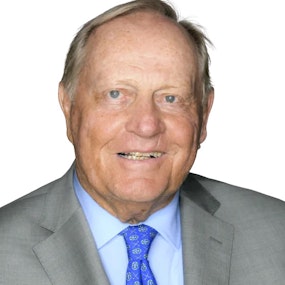
Nicklaus, Jack
Golf Professional and Golf Course Architect
By the most objective measure of all – the record – Jack Nicklaus is the greatest player who ever lived. There was an immensity to Nicklaus’ game. Nicklaus combined tremendous physical ability with boundless mental and psychological resources. At those times when his game was in full song, he would dominate his competition. But Nicklaus’ ultimate genius was that when it wasn’t, he often found a way to win because he would almost never beat himself.
His style was a combination of explosive shotmaking and conservative management that calculated all factors: the course, his opponents and how he was playing. As a golfer, Nicklaus was both Secretariat and Einstein. Subjective assessments, however, are secondary because Nicklaus’ record is a colossus that encapsulates the game. In sheer numbers, it is awesome.
Between 1962 and 1986, Nicklaus won 73 official events on the PGA TOUR, trailing only Sam Snead and Tiger Woods for most wins in PGA TOUR history. But it is Nicklaus’ performance in Major Championships alone that sets him above all others. He won 2 U.S. Amateurs, a record six Masters, a record-tying four U.S. Opens, three Open Championships, and a record-tying five PGA Championships. He completed three full cycles of the modern Grand Slam. If performance in Major Championships is the ultimate criterion, then no golfer has ever set themselves apart like Nicklaus.
Nicklaus was born January 21, 1940, in Columbus, Ohio. His father, Charlie, was a pharmacist who introduced his son to sports and remained his greatest friend and supporter. While growing… Read More
New to FORE the Good of the Game?
Here are some great episodes to start with. Or, check out episodes by topic.














